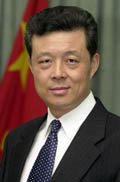
China's new ambassador to North Korea, Liu Xiaoming, made the rounds in Pyongyang September 19, meeting with DPRK Premier Pak Pong Ju, Vice Premiers Kwak Pom Gi and Ro Tu Chol, Minister of Foreign Trade Rim Kyong Man, Secretaries of the Central Committee of the WPK Choe Thae Bok and Kim Ki Nam, and several others. The visits followed Liu's introductions in the DPRK September 11, when he met with Kim Yong Nam, President of the Presidium of the SPA.
Liu's arrival comes as Beijing and Pyongyang ties have been strained since before the July 5 missile tests. But Beijing has been making moves to shore up its influence in Pyongyang. On September 14, the Chinese Foreign Ministry said it was not altering the Treaty of Friendship, Cooperation and Mutual Assistance with North Korea, and north Korea reported September 20 that "The government of China provided the DPRK with aid materials including food and diesel fuel in connection with flood damage," resuming aid that has been sparse (if existent at all) since July.
But Liu himself is the most interesting thing here. Liu was born in Shenyang City, Liaoning province in 1956 - three years after the end of the Korean War. He is the first Chinese Ambassador to Pyongyang born after the cessation of hostilities between the two Koreas. This means Liu is not of the generation that knows the meaning of an alliance "sealed in blood," nor really of the significance of "lips and teeth."
Adding to this, Liu is not even someone who knows much about North Korea. Liu started in the Ministry of Foreign Affairs in 1974, coming out of Dalian Universtiy of Foreign Languages. His first posting was as a staff member of the embassy in Zambia from 1975 to 1978. Upon returning to China, he moved into the Department of North America and Oceania Affairs until 1989, though while working at the ministry he got his masters degree from Tufts University, Fletcher School of Law and Foreign Affairs in 1983.
In 1989, Liu was posted to the Chinese Embassy in Washington D.C., where he rose through the ranks to become First Secretary from 1990 through 1993 - a time when China was redefining its international relations in the wake of the Tiananmen Square incident. From 1993 to 1998, Liu returned to the Department of North America and Oceania Affairs, only to return to the Embassy in Washington from 1998 to 2001 as Minister Plenipotentiary. From there, Liu transferred to Egypt, where he served as Chinese Ambassador until 2004.
He then returned to China for a two-year stint as Assistant Governor and Deputy Secretary-General of the people's Government of Gansu Province (the province where current Chinese president u Jintao got his start in the 1970s and 1980s). Liu was then appointed Ambassador to the DPRK - despite his almost exclusive focus on Chinese relations with the United States during his career.
But this in itself is the reason Liu was sent. It seems China thinks North Korea is doing a bad job of reading the united States, and is sending an Ambassador who isn't there to reassure Pyongyang of the blood-ties, but instead to advise the North Korean government on a more tactful and appropriate approach to international relations. Whether Pyongyang listens, however, we have yet to see. But China may be through with the heavy-handed tactics or the acquiescence to North Korean whims, and instead is now taking the role of elder brother or scholar, and gently advising the North Korean regime.



No comments:
Post a Comment